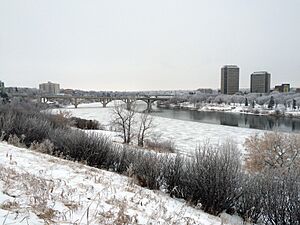Saskatoon freezing deaths facts for kids

The Saskatoon freezing deaths were sad events that happened in and around Saskatoon, Saskatchewan. These events involved Indigenous Canadians who were left outside in very cold weather during the 1990s and early 2000s. It was later confirmed that members of the Saskatoon Police Service were involved. Police officers would take Indigenous people, often men, to the edges of the city at night in winter. They would then leave them there, even when temperatures were below freezing.
This practice was sometimes called "starlight tours." It has been happening since at least 1976. As of 2021, no Saskatoon police officer has been found guilty specifically for causing these freezing deaths. However, some officers were found guilty of other related actions.
Contents
Sad Incidents
Several people sadly died from hypothermia (when your body gets too cold) because of these events. These included Rodney Naistus, Lawrence Wegner, and Neil Stonechild. Rodney Naistus and Lawrence Wegner died in 2000. Their bodies were found outside Saskatoon. Investigations in 2001 and 2002 showed they died from hypothermia. The investigations suggested changes to police rules and how police work with Indigenous communities.
Neil Stonechild's body was found on November 29, 1990, in a field outside Saskatoon. He had disappeared five days earlier, on November 24, 1990. That night, the temperature was extremely cold, reaching -28.1 degrees Celsius. An investigation in 2003 could not figure out exactly how he died.
In January 2000, Darrell Night was also left on the edge of Saskatoon. Luckily, he was able to call a taxi from a nearby power station. The two police officers involved, Dan Hatchen and Ken Munson, said they had just given Mr. Night a ride home. But they were later found responsible for holding him against his will in September 2001.
At first, the Saskatoon police said these were just a few separate events. But in 2003, police chief Russell Sabo said it was possible that officers had been leaving First Nations people outside the city for many years. He shared that in 1976, an officer was disciplined for doing the same thing to an Indigenous woman.
On April 21, 2018, Ken Thomas said that two Saskatoon police officers picked him up and dropped him off outside the city limits at night in the cold. This claim was looked into by a special commission. They said they could not find enough proof to support his claim. The police chief, Troy Cooper, also said it was unlikely there was contact that night based on police car recordings.
Trying to Hide Information
Between 2012 and 2016, parts of the English Wikipedia article about the Saskatoon Police Service that talked about "Starlight tours" were deleted many times. An investigation found that two of these deletions came from a computer inside the police service. A police spokesperson, Alyson Edwards, said that the police force did not officially approve removing this information.
On March 31, 2016, the Saskatoon StarPhoenix newspaper reported that police confirmed someone from inside the department deleted these parts from Wikipedia. The police spokesperson said they couldn't find out who did it. She also said the police force was working to move forward with positive changes that came from the Stonechild investigation.
In Books, Movies, and Music
These sad events have been talked about in different types of media.
Film
Darrell Night's experience was shown in a 2004 documentary film called Two Worlds Colliding. It was made by Tasha Hubbard and won an award. A made-up story about a similar event was also shown in a short drama called Out in the Cold. This film starred actors like Gordon Tootoosis.
Music
In 2005, the Canadian punk rock band Propagandhi released a song called "The Bringer of Greater Things." The song was dedicated to Rodney Naistus, Neil Stonechild, and Lawrence Wegner.
Canadian musician Kris Demeanor wrote his song "One Shoe" about the Saskatoon freezing deaths, especially Neil Stonechild's story. The band The Wailin' Jennys also had a song called "Starlight" that was inspired by these events.
In 2017, Mi'kmaq artist Cathy Elliott worked with students to create a musical called Starlight Tour.
Podcasts
The freezing deaths are also discussed in podcasts like Criminal and Commons.
Television
An episode of the TV show Da Vinci's Inquest called "The Sparkle Tour" showed a story about an Indigenous activist who died. The story was similar to the Saskatoon freezing deaths, which were called "sparkle tours" in the episode.
See also
- Disappearances of Terrance Williams and Felipe Santos
- List of cases of police brutality in Canada
- Pinkenba Six
- Highway of Tears
 | Toni Morrison |
 | Barack Obama |
 | Martin Luther King Jr. |
 | Ralph Bunche |

